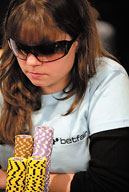Rising star signals new age of poker

Say you wander down the hall at home this week and one of your little angels somehow has cracked the parental control software on the family computer, where an Internet poker tournament is being staged. Your first instinct might be to hand out a severe punishment, like forcing the child to sit through a taped marathon of UNLV football the past few years.
Suggestion: Don’t rush to judgment. Check out how the kid is doing. See how many chips the little bandit is holding.
You just might have another Annette Obrestad on your hands, and wouldn’t that be nice for retirement?
Things get serious at the World Series of Poker today, when the World Championship of No-Limit Texas Hold’em gets under way, a Main Event that paid its winner $8.25 million last year and long ago piqued mainstream interest like the next celebrity divorce.
One of the planet’s most celebrated card games has grown far bigger than a gold bracelet and instant fame among all others with the fashion sense of Courtney Love. Thousands of hopefuls will sit and play the $10,000 buy-in event, all with the same dream: If you can’t cash big, at least get some ESPN face time for your iPod and sunglasses.
Obrestad won’t sit at a table inside a Rio ballroom. She’ll have to sneak inside just to watch, which we’re pretty certain she did last year by sandwiching herself between a few tall fans but can’t officially confirm (wink, wink).
She is 19, two years shy of the minimum age to gamble in a Nevada casino. She is still at that age when statutes allow those under 21 only to pass swiftly through the land of slot machines and gaming tables, still like that high school basketball phenom good enough to compete in the NBA today and yet refused entry until a birth certificate catches up with the rules.
"The regulation is 21, and that’s it, and Harrah’s takes it very seriously," said Seth Palansky, spokesman for the gaming corporation. "It would be great if Annette could play, but it won’t be until 2010 before her coming-out party."
Here, yes. But she already has proven how years of Internet training can translate into live success abroad, where the minimum age to gamble is 18. She is the model for what hundreds of thousands of cyberspace hands can do for a player.
Obrestad is from Sandnes, Norway, and last year sat among a field at the inaugural WSOP Europe in London with such giants as Doyle Brunson and Johnny Chan and Phil Hellmuth. She walked away the Main Event champion and just over $2 million richer, a record payout for a woman. She approved of the winner’s check but wasn’t awed with anyone she traded bluffs with to earn it.
"I wasn’t that impressed, to be honest," Obrestad said. "I really need to play with someone for a while to know how I feel about them as a player. I think the average online player is better than the average live player by far. It’s so much easier to learn the game online, where there is so much information available.
"I totally understand the (age limit in Nevada). It’s just that way. Of course I would love to play, but there is nothing I can do about it until I’m 21."
Here is how you become a star: You begin playing card games at age 12 with your parents — "I would crush them," Annette says — and your father eventually introduces you to poker. You don’t really take to that five-card stuff, but at 15 discover Hold’em online. You give yourself the online nickname "Annette_15" and play fairly conservatively for a year but then realize a more aggressive approach is needed to cash more.
You get so good, your resume builds to include facts about winning a sit-and-go Internet event without looking at your cards and increasing a bankroll so fat from freeroll winnings, you have never once made a deposit online.
"I’m not surprised anyone young does well now because of the amount of experience they can get (online)," said 42-year-old Annie Duke, one of history’s top female players. "When I started out, there were about 10 tournaments I could play in a year. Now, kids can play 10 in half a day. It’s a different world.
"(Obrestad) is very talented. With her, it’s going to be the same thing as everyone — does she avoid falling into certain traps, does she get overconfident, does she end up with leaks (in her game), does she fall into those kinds of issues. If not, she has a very bright future. She clearly knows what she is doing."
One lesson in this: Before you yell at the little bandit about playing around on the computer, make sure the kid didn’t just start the next hand ace-ace.
Ed Graney’s column is published Sunday, Wednesday, Thursday and Saturday. He can be reached at 702-383-4618 or egraney@reviewjournal.com.